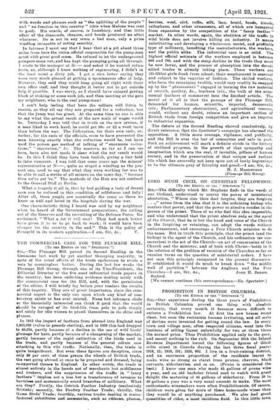THE COMMERCIAL CASE FOR THE PLUMAGE BILL. [TO THE EDITOR
OF THE " SPECTATOR.] SIR,—The Plumage Bill passed its Second Reading in the Commons last week by yet another thumping majority, in spite of the usual efforts of the trade spokesmen to evade a vote by meaningless -hatter. During the last few weeks the Plumage Bill Group, through one of its Vice-Presidents, the Editorial Director of the five most influential trade papers in the country, has been collecting evidence dealing solely with the commercial case for the Bill, and, with the permission of the editor, I will briefly lay before your readers the results of this inquiry. They are of great importance, since the com- mercial aspect is the only one upon which any kind of con- troversy exists or has ever existed. None but inhuman clods or the financially interested can think it good that the world should be ravaged of 'its bird-life from pole to pole simply and solely for idle women to prank themselves in its skins and plumes.
In 1913 the import of feathers from abroad into England was 1,063,9N (value in pounds sterling), and in 1920 this had dropped to 48,234, partly because of a decline in the use of wild birds' plumage for hats, partly because of a cheapening of the market, partly because of the rapid extinction of the birds used in the trade, and partly because of the general odium now attaching to this vile traffic. Nationally, then, the trade is quite insignificant. But even these figures are deceptive, since only 20 per cent. of them grease the wheels of British trade, the rest going abroad at once to be prepared and dressed, being re-exported -thence to England. In other words, the trade is almost entirely in the hands not of merchants but middlemen and brokers, and the suppression of the traffic in " fancy feathers " implies not a loss but a transference of revenue to harmless and economically sound branches of millinery. What are they? Firstly, the Ostrich Feather -Industry (exclusively British); secondly, the Poultry Feather Trade; thirdly, the Game Birds' Trade; fourthly, various trades dealing in manu- factured substitutes and accessories, such as ribbons, Plumes, berries, wool, °ire, raffia, silk, lace, braid, 'beads, tinsels, cellophane, and other ornaments, all of which are :hampered from expansion by the competition of the " fancy feather" market. In other words, again, the abolition of the traffic in wild birds does not involve killing an industry. It means substituting and developing a wholesome, sound, and profitable type of millinery, benefiting the manufacturers, -the .workers, and the public alike. The industrial case Is as solid. The highest official estimate of the workers employed is between 600 and 700, and with the steep decline in the trade they must be now fewer, and the process of absorption into the decent allied trades is already taking place. These workers are (11-12ths) girls fresh from school; their employment is seasonal and subject to the vagaries of fashion. The skilled workers, who form the remaining twelfth, would very readily be snapped up by the " plumassiers " engaged in turning the raw material of ostrich, poultry, &c., feathers (viz., the bulk of the orna- mental feathers of commerce) into the finished article. The moral of it all is that the passage of the Plumage Bill, demanded for human, scientific, imperial, democratic (viz., Parliamentary obstruction), and agricultural reasons, would, without any doubt, release an important section of British trade from foreign competition and give an impetus to industrial expansion.
The debate at the Second Reading showed conclusively, by direct reference, that the Spectator's campaign has alarmed the opposition. A little more courage, vigilance, and publicity, and the Bill is over the bar of committee and safe in port. Such an achievement will mark a definite stride in the history of civilized progress, in the growth of that sympathy and imagination which are the real, if invisible, pillars of human society, and in the preservation of that unique and radiant life which has assuredly not been spun out of lowly beginnings to be the ultimate prey of frivolity and.greed.—I am, Sir, &c.,
H. J. MASSINCHAII (Plumage -Bill Group).


































 Previous page
Previous page